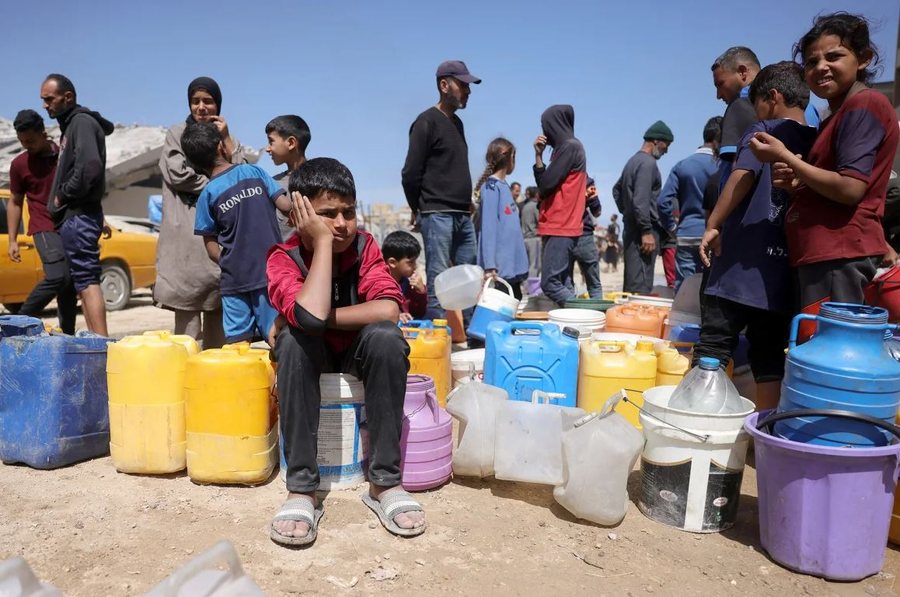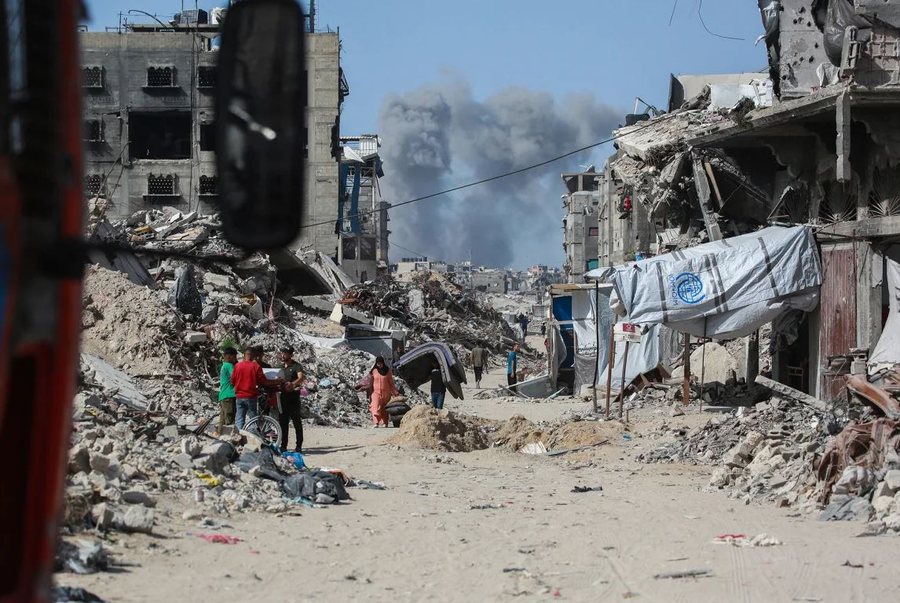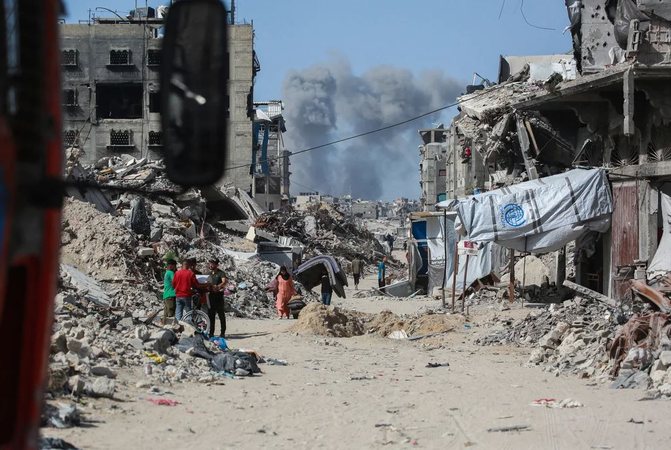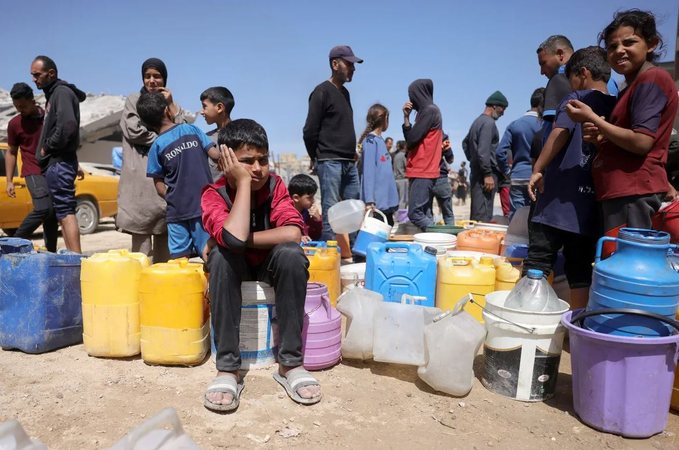In war-torn and famine-stricken Gaza, 12-year-old Jana Mohammed Khalil Musleh Al-Skeifi has become the backbone of her family. Wearing a pink T-shirt with pictures of Cinderella, she wanders through rubble, dust and dirt every day with a basin in hand, searching for water and food. CNN tells the story of her, who, since an Israeli sniper killed her brother, has taken on responsibilities that are not appropriate for a child. Her parents are in poor health, so it is now up to her to take care of them.
"I don't want my father to get tired. That's why I'm strong. I want to be strong so my father doesn't suffer," Jana told CNN while waiting in line at a water distribution point in Gaza City. "My father is old and has heart disease. If he tries to hold the bucket, he won't fall," A2 CNN reports.
Saving her father the tedious work, the little girl carried two heavy buckets full of water all the way home, her knuckles white from the heavy load and her jeans soaked from the water that spilled here and there.
Finding food and water became difficult after Israel launched its brutal war in Gaza following the October 7 terrorist attack by Hamas and its allies. But the situation has become catastrophic since Israel imposed a total blockade on all aid more than 11 weeks ago.
A United Nations-backed report released this month said one in five people in Gaza are facing hunger, as the territory, home to 2.1 million people, moves closer to a man-made famine.
Israel said the blockade, along with a new military campaign, was aimed at pressuring Hamas to release hostages held in the enclave. But many international organizations have accused Israel of using starvation as a weapon of war.
Providing clean water has been difficult for months because Israel restricts access to water treatment and desalination equipment, claiming that these items could be used to produce weapons.
Doctors Without Borders, the humanitarian organization, said that more than two-thirds of the 1,700 items of water and sanitation it sought to bring to Gaza between January 2024 and early March 2025 were rejected by Israeli authorities.
"You can barely fill a bucket because there's no proper queuing system, and if you wait, you might not get anything. Sometimes we have to go without water. You sit there for hours just waiting to fill a bucket. It's a terrible feeling," Jana said, A2 CNN reports.
The family told CNN that in the past they have used salt water for cleaning and cooking.
"A drop of water in the ocean" of need
The Israeli military announced on Sunday that it would allow a "basic amount of food" to enter Gaza as it launched its new major offensive in the Strip. The reason, the military said, was that a "hunger crisis" in Gaza would "jeopardize the operation."
The next day, Israeli Prime Minister Benjamin Netanyahu indicated that Israel had taken this step because its Western allies, including the United States, were threatening to withdraw their support for the country if the latter allowed Gaza to starve.
But only five trucks were allowed in on Monday, when aid agencies said 500 were needed a day just to feed those most in need. UN aid chief Tom Fletcher described the distribution as a "drop in the ocean of what is urgently needed," A2 CNN writes.
The famine is becoming catastrophic. The Gaza Health Ministry said at least 57 children have died from the effects of malnutrition since the war began.
Jana's little granddaughter, Janat, was one of them, her family says.

Everyone was just watching.
While Janat was born tiny, weighing just 2.6 kilograms, her mother, Aya, told CNN that the girl was growing and gaining weight. She became a healthy baby, reaching a weight of about 4 kilograms. She learned to smile, was alert. But things changed when Janat was six weeks old.
On March 2, Israel imposed a total blockade on Gaza, preventing even the most basic supplies, including baby formula and medicine, from entering the Strip.
Aya said that when food became scarce, she began to have difficulty breastfeeding Janat, who began to lose weight. The baby developed chronic diarrhea, became dehydrated, and soon became so ill that she needed medical attention.
"(At the hospital) they said there was a special medical milk that would help him gain weight and stop the diarrhea, but we couldn't find it. We searched all over Gaza, hospital by hospital, pharmacy by pharmacy. Even the Ministry of Health told us it wasn't available," Aya told CNN.
A CNN video of Janat from mid-April shows the tiny baby wrapped and held tightly by Aya. Her tiny face is all bones under the skin, and she looks more like a newborn than a four-month-old. Her long, thin fingers poke out from under the blanket, and she looks sleepy. Her large brown eyes are the only part of her exhausted body that seems to be able to move, her gaze following people as they move around her.
At the same time, Janat’s mother was also suffering, weakened by the lack of food and clean water. Like many young mothers in Gaza in these conditions, she lost her milk supply, unable to feed her baby. The UN-backed hunger report said that almost 11,000 pregnant women in Gaza are already at risk of starvation, and nearly 17,000 pregnant and breastfeeding women will need urgent treatment for acute malnutrition in the coming months.
Janat's condition continued to deteriorate. Her mother told CNN that the baby began struggling to maintain her body temperature, and doctors said her blood sugar levels were dangerously low. Her oxygen levels were dropping. Malnutrition caused her kidneys and liver to malfunction, and as a result, her blood became acidic.
"I begged the whole world to save her. I just wanted someone to save her, to provide her with the milk she needed. But no one could help. Everyone was watching," said Janat's mother.
She told CNN that doctors at the hospital had recommended Janat seek medical treatment abroad. The family even managed to secure the necessary paperwork, including a referral and permission for Janat to leave.
But the little girl died on May 4, before that could happen. At four months old, she weighed just 2.8 kilograms, slightly more than her birth weight.
Medical evacuations from Gaza have been extremely rare, even more so since Israel resumed military operations after breaking the ceasefire in March.
The World Health Organization (WHO) said last week that about 12,000 patients in Gaza need medical evacuation and that only 123 people have been evacuated since the blockade was imposed in March.
Looking through Janat's photos, the day after the baby's death, Jana was tearful and upset. "They told us she couldn't be treated unless she traveled abroad. We waited, they kept saying 'Saturday' and 'Sunday', we waited until she died," Jana said.

"I feel like I'm dead"
After 18 months of war, every aspect of Jana's life is fraught with hardship. She has little food to eat and water to drink, no school to go to, no safe place to sleep. There is no electricity, and the place she calls home is a half-destroyed house in Gaza City. Its walls are charred by fire.
Jana lived in a house where water came from the tap and light came on at the flick of a switch. There was food, school, a dance performance during which she and her friends were the center of attention, wearing matching clothes and dancing while everyone applauded.
A family video from the event looks like any other video taken by proud parents of a child performing in public. It's slightly shaky, zoomed in on Jana as she dances around.
Seeing it amidst the destruction, surrounded by bombed-out houses and piles of rubble, the images seem to come from another universe.
"I have no one left. I feel like I'm dead," the 12-year-old told CNN, tears streaming down her cheeks. "Emotionally, I'm dead."
Jana's large family has been devastated by the war. She has lost a brother, a brother-in-law, a cousin and a niece, and is devastated by the loss of her mother, who has thyroid cancer that is currently untreatable in Gaza.
According to the Gaza Health Ministry, more than 53,000 Palestinians have been killed in the war over the past 18 months, roughly 4% of the Strip's population. That means that for every 40 people who lived in Gaza before the war, one is now dead.
But there is little time to mourn them when survival requires so much effort.
Hungry children begging for food
On May 12, the day before CNN last met with Jana, she managed to find food to buy: 500 grams of pasta for 50 shekels, or $15.
Like many families in Gaza, they grind pasta into flour to make bread, an attempt to make it last longer. Gaza has long run out of flour.
The next day, when a nearby community kitchen is stocked with food, a large crowd of hungry children gathers within minutes.
They watch the workers' every move, eagerly awaiting the moment when the food is ready.
It's clear there isn't enough for everyone, so the children race to get their pots as far forward as they can, desperately trying to get the attention of those distributing the meals. Some scream and cry.
Jana is lucky. Two balls of pasta with watered-down tomato sauce fall into her lap. She looks exhausted and hungry, but happy.
As she walks home with the bucket of food, she doesn't touch it. Not until she gets home to her hungry siblings, nieces, and nephews.
Only then, by sharing it with them, does Jana allow herself to be involved in it.
(A2 Televizion)












